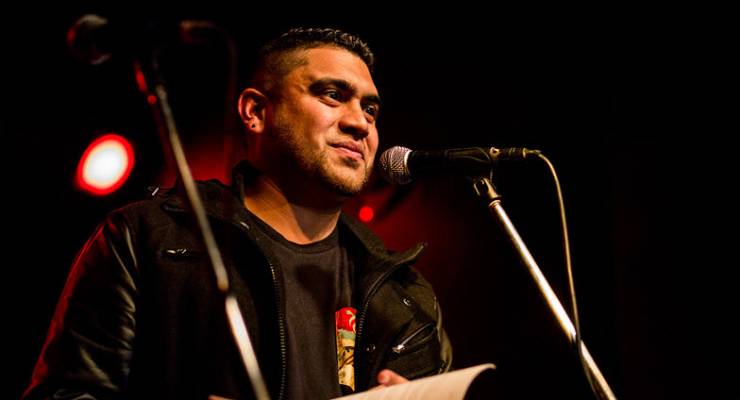
If the backlash over Tina Fey’s “ignore the Nazis and eat cake” advice, the Sunrise team’s years of paid Pauline Hanson spots, or Tom Tilley’s interview with a Charlottesville riot organiser is anything to go by, critics are fed up with the media underestimating and platforming white supremacy groups.
The question of how to faithfully represent neo-Nazis without condoning them is familiar to poet, rapper, author and now television writer for Stan’s upcoming Romper Stomper sequel Omar Musa.
Musa sympathises with critics of the renewal, but argues that stories like these are important “because I think in Australia we can be so complacent, and so apathetic, that we don’t truly ask the hard questions about ourselves, about who we are”.
“There’s a lot of people who say this shouldn’t have been made in the first place, and are worried there is, in a Trump-esque way, equivalence being made between the far-right and people protesting that,” Musa said.
“I don’t think we’ve done that, we weren’t trying to do that, but we were definitely trying to show a chaotic, messy world, a shifting cultural battleground that exists in Australia and could exist.”
Musa is right in that, out of the early reactions to the series, “why?” has been the most prominent. The original was mired in controversy, and, whether fairly or not, was perceived to inspire the far-right groups it aimed to critique.
Now, ahead of the January 1, 2018, premiere, critics are questioning the need for a sequel series. The spin-off to the 1992 movie Romper Stomper marks the return of original actors and director Geoffrey Wright while incorporating new characters such as Lachy Hulme’s neo-Nazi “Blake”, “anti-fash” counter-protesters, and a Muslim-Australian university student “Laila” (Nicole Chamoun).
While he jokes about not having had time to actually watch the new series, Musa was uniquely equipped to write for it. Creator of three recently released pieces of art, the book Here Come The Dogs, rap album Since Ali Died, and poetry collection Millefiori, Musa worked as a series writer and, while he says it was a steep learning curve, was responsible for the fourth episode in particular.
And while he acknowledges it would leave him open to criticism from all sides, Musa lists another core reason for taking the job: fleshing out the Muslim-Australian characters. He says a common criticism of the original was its depiction of Vietnamese-Australians “as a bit of an amorphous blob”.
“And so I saw it as my responsibility, or part of why I wanted to be involved, even though it was going to be really difficult, to change that balance and that dynamic. And if there were to be Muslim characters, they had to have names, and backstories, and flaws, and nuance.”
On top of the shift between racial targets, Romper Stomper (2018) maps the evolution of far-right politics in Australia, including the fact that hate groups are now proudly marching in the open while incorporating a frustrating, insidious form of grievance culture; Blake’s fear that Muslims will “bully my people into accepting your culture” speaks volumes about the increasingly prevalent idea that white supremacists, not people of colour, are the real victims.
“It’s a really strange sort of power dynamic, where someone like Andrew Bolt would claim he’s being bullied in some way when simply being held to account for the type of language they use.”
One of the most interesting characters in the sequel series might be a radio personality played by David Wenham. Musa, citing an article by David Foster Wallace, talks about the role of the shock jock as primarily that of entertainer, one who might toy with violent and degrading ideas for superficial reasons but normalises them nonetheless.
Musa also says that while Australia doesn’t currently have far-right groups to the extent that Europe does — where neo-Nazis worryingly marched in the tens of thousands last month — the series acts as a projection of what could happen if racism is left unfettered in the country.
Asked whether he had to interview members of the far-right to prepare for the job, Musa stifles a laugh: “I mean look man my name is Omar bin Musa; I’ve had some of these characters hit me up online. I’ve had these people on social media, I’ve looked at their profiles, I’ve looked at the type of things they talk about. I’ve tried to think about why it is they do what they do and think what they think.”
“It was difficult stuff and I went through a lot of soul-searching, I think that everyone did who worked on this. Why are we doing this? Is it necessary? Is it the right time?”
“But as far as I’m concerned, I’m an artist, I’m a writer; that’s what I do. I dissect and interrogate the world. If I can see people writing op-eds, and writing comments, opinion pieces, on the danger that is the rise of the far-right, then surely we can also make drama about it.”








Recently a man sent me conspiracy theory articles alleging that the Jews never lived in Egypt and never had connections with the Middle East either, delegitimising them in short. In no way commenting on Israel today, but this is alt history and quite racist. Maybe one of these revisionist types could be written into the series too. They seem to be targeting non far right people too- like me.